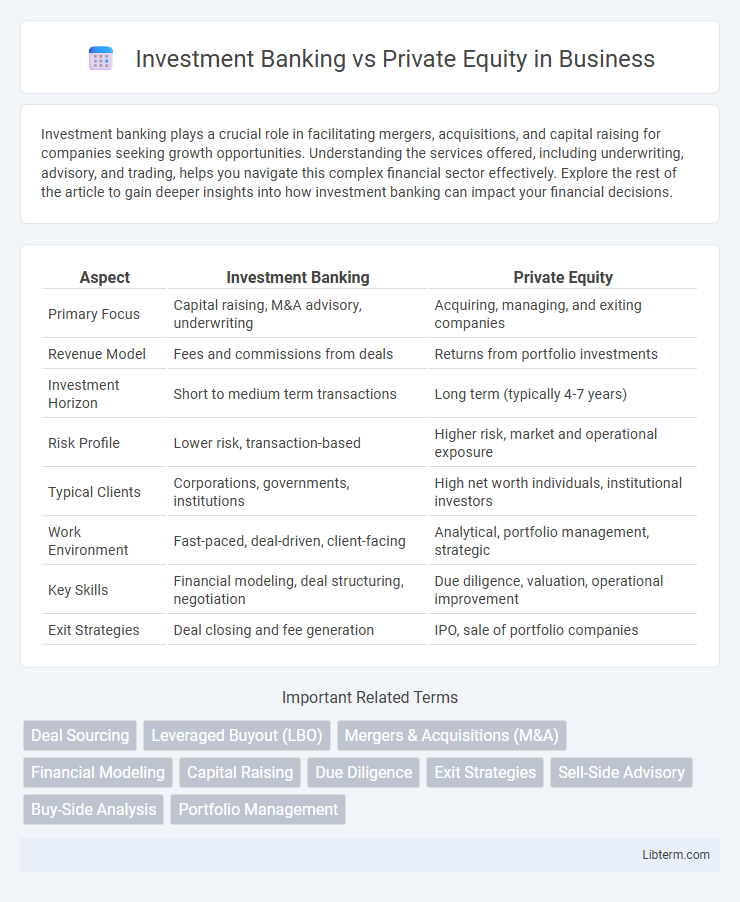Investment banking plays a crucial role in facilitating mergers, acquisitions, and capital raising for companies seeking growth opportunities. Understanding the services offered, including underwriting, advisory, and trading, helps you navigate this complex financial sector effectively. Explore the rest of the article to gain deeper insights into how investment banking can impact your financial decisions.
Table of Comparison
| Aspect | Investment Banking | Private Equity |
|---|---|---|
| Primary Focus | Capital raising, M&A advisory, underwriting | Acquiring, managing, and exiting companies |
| Revenue Model | Fees and commissions from deals | Returns from portfolio investments |
| Investment Horizon | Short to medium term transactions | Long term (typically 4-7 years) |
| Risk Profile | Lower risk, transaction-based | Higher risk, market and operational exposure |
| Typical Clients | Corporations, governments, institutions | High net worth individuals, institutional investors |
| Work Environment | Fast-paced, deal-driven, client-facing | Analytical, portfolio management, strategic |
| Key Skills | Financial modeling, deal structuring, negotiation | Due diligence, valuation, operational improvement |
| Exit Strategies | Deal closing and fee generation | IPO, sale of portfolio companies |
Introduction to Investment Banking and Private Equity
Investment banking involves providing advisory services for mergers, acquisitions, and capital raising, playing a crucial role in financial markets by connecting companies with investors. Private equity focuses on acquiring equity ownership in private companies through leveraged buyouts or growth capital investments, aiming to improve performance and achieve high returns. Both sectors require strong financial analysis and deal structuring skills but differ in investment horizon and involvement in portfolio companies.
Core Functions: Investment Banking Explained
Investment banking primarily focuses on facilitating capital raising through underwriting securities, advising on mergers and acquisitions, and providing strategic financial advisory services to corporations and governments. Core functions include underwriting initial public offerings (IPOs), issuing bonds, and assisting with debt and equity sales to optimize client capital structure. Investment bankers analyze market conditions, conduct due diligence, and structure complex transactions to maximize value and ensure regulatory compliance.
Core Functions: Private Equity Explained
Private equity primarily focuses on acquiring ownership stakes in private companies to enhance their value through strategic management and operational improvements. Investment banks engage in underwriting, facilitating mergers and acquisitions, and raising capital for clients, acting as intermediaries between investors and companies. Private equity firms actively manage portfolio companies to achieve long-term growth and profitability, differentiating their role from the advisory and transactional emphasis of investment banking.
Key Differences in Business Models
Investment banking primarily generates revenue through advisory fees and underwriting services by facilitating mergers, acquisitions, and capital raising for clients, operating on a transaction-based fee model. Private equity firms invest directly in companies, acquiring equity stakes with the goal of enhancing value over time and realizing returns through eventual exit events such as IPOs or sales. The business model of private equity emphasizes active management and long-term capital appreciation, contrasting with investment banking's shorter-term, service-oriented revenue structure.
Revenue Streams and Compensation Comparison
Investment banking generates revenue primarily through advisory fees, underwriting commissions, and trading profits, while private equity earns income via management fees and carried interest from portfolio investments. Compensation in investment banking typically includes base salary, bonuses linked to deal flow, and trading performance, whereas private equity professionals benefit from smaller salaries compensated by substantial carried interest tied to fund performance. Both sectors offer high earning potential, but private equity compensation structures often lead to significant wealth accumulation through long-term gains on invested capital.
Skills Required in Investment Banking vs Private Equity
Investment banking demands strong financial modeling, valuation, and deal execution skills, alongside excellent client communication and the ability to work under high-pressure environments. Private equity requires proficiency in due diligence, portfolio management, and strategic decision-making, with a greater emphasis on long-term investment analysis and operational improvement. Both fields value analytical acumen and attention to detail, but private equity places more weight on industry expertise and interpersonal skills for managing relationships with portfolio companies.
Career Progression and Exit Opportunities
Investment banking offers fast-paced career progression with clearly defined roles from analyst to managing director, providing extensive exposure to deal-making and financial modeling. Private equity careers typically begin post-investment banking, emphasizing portfolio management, operational improvements, and strategic investment decisions, with roles advancing from associate to partner. Exit opportunities in investment banking often lead to roles in private equity, corporate finance, or hedge funds, while private equity professionals may transition into portfolio company management, hedge funds, or start entrepreneurial ventures.
Work Culture and Lifestyle Differences
Investment banking demands long hours with a high-pressure, fast-paced environment, often involving frequent client interactions and tight deadlines. Private equity offers a more structured schedule with a focus on long-term investment strategies, allowing for a better work-life balance compared to the demanding banking sector. Analysts in private equity usually deal with fewer transactions but more in-depth analysis, contributing to a lifestyle that prioritizes quality of work over quantity.
Risk Profiles and Investment Strategies
Investment banking involves underwriting, advisory services, and facilitating capital raising with relatively lower direct risk exposure, focusing on transactional fees rather than asset ownership. Private equity assumes higher risk by investing directly in companies through buyouts or growth capital, aiming for long-term value creation and significant returns via operational improvements or strategic repositioning. The investment strategies differ as investment banks prioritize deal origination and market liquidity, while private equity funds emphasize active portfolio management and exit planning.
Choosing Between Investment Banking and Private Equity
Choosing between investment banking and private equity depends on career goals, work-life balance, and skillset preference. Investment banking offers exposure to diverse financial transactions, high-pressure environments, and faster deal cycles, while private equity emphasizes long-term value creation, portfolio management, and deeper company analysis. Candidates prioritizing strategic influence and ownership focus often lean towards private equity, whereas those seeking transaction experience and broader industry exposure may prefer investment banking.
Investment Banking Infographic

 libterm.com
libterm.com